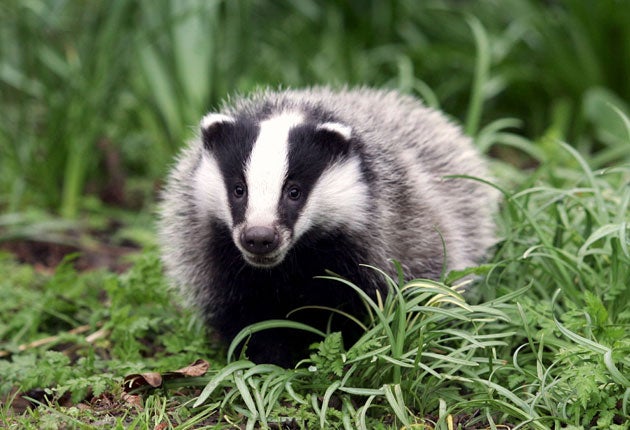Ministers braced for animal-lovers' anger over badger cull plan
Government expects legal challenges from wildlife activists as it consults on how to tackle TB in cattle

Farmers in England are to be issued with licences to cull badgers under plans to halt the spread of tuberculosis in cattle herds, which will spark a storm of protest from animal lovers.
Caroline Spelman, the Environment Secretary, will risk legal action – and the wrath of generations of Wind in the Willow readers – to give the go-ahead for a cull in the areas worst affected by the disease.
The coalition will launch a public consultation later this month on the precise details of the scheme, which would allow landowners who can prove the measures are necessary to cull and vaccinate badgers over an area of at least 50 square miles.
As well as the distress to farmers caused by the slaughter of infected herds – 25,000 cattle were destroyed last year – the ongoing crisis which has gripped the countryside also costs the Treasury millions every year. Compensation payments totalled around £90m in 2009, with cases concentrated in the south-west of England.
The move will not be without controversy. Politics and wildlife rarely make happy bedfellows. Labour endured a storm of protest after bringing in a foxhunting ban which has proved almost impossible to police or enforce.
A senior source at the Department for Environment, Food and Rural Affairs said: "This will not be popular with people who view badgers as something from Wind in the Willows or Beatrix Potter, but it is the right thing to do. We cannot go on not taking action to deal with this huge problem."
While there is widespread evidence that badgers carry TB and can pass it to livestock, a decade-long study, costing £35m, by the Independent Scientific Group on Cattle TB, concluded that culling could not "meaningfully contribute" to control of the disease because it displaces the badgers, spreading the disease over a wider area. As a result, the Labour government rejected calls for a cull, and instead focused on vaccination. However, the issue remains contentious, with the former chief scientist Sir David King saying culling has a part to play.
A cull ordered by the Welsh Assembly has been dogged by controversy and legal challenge, costing the taxpayer £57,000. In July, the Badger Trust, which opposes any cull, won a court appeal to halt a planned cull of 1,500 badgers in north Pembrokeshire and parts of Ceredigion.
The coalition is braced for a challenge in England, where the cull is likely to be larger. Earlier this year, the Farming minister Jim Paice stressed the need for civil servants to "get absolutely everything sorted before we commence" because campaigners would challenge the plan through judicial review. "We must make sure that either they are convinced they can't win, or we win if it does go to review," he said.
Earlier this year, researchers from Imperial College London and the Zoological Society of London suggested repeated culling of badgers reduces the incidence of TB in cattle, but the benefits disappeared four years after the programme ended.
To cull or not to cull?
In favour
Sir David King, the former chief scientist, believed the high cost of a cull would be offset by the reduction in TB.
Peter Kendall, the president of the National Farmers' Union, said of a decision not to cull: "This is devastating for the farming families whose lives and businesses are being ruined by TB in cattle."
Against
A 2008 study by the Independent Scientific Group on Cattle TB said culling could not "meaningfully contribute" to controlling the disease.
An Imperial College London and Zoological Society London study found the practice to be cost-ineffective.
Government trials have concluded that culling only works over more than 300sq km, otherwise badgers just move.
Join our commenting forum
Join thought-provoking conversations, follow other Independent readers and see their replies
Comments
Bookmark popover
Removed from bookmarks